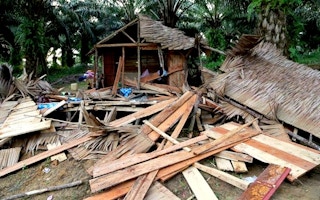A member of the Suku Anak Dalam indigenous community in Sumatra, Indonesia died on Thursday following a clash with security personnel in a palm oil concession owned by PT Asiatic Persada – a palm oil trader long implicated in similar conflicts.
To continue reading, subscribe to Eco‑Business.
There's something for everyone. We offer a range of subscription plans.
- Access our stories and receive our Insights Weekly newsletter with the free EB Member plan.
- Unlock unlimited access to our content and archive with EB Circle.
- Publish your content with EB Premium.
The firm is part of palm oil agribusiness and bio-energy company Ganda Group, which supplies to world’s largest palm oil trader Wilmar International.
This puts Singapore-listed Wilmar in a bad light, since the firm has only just implemented its ‘no deforestation, no peat, no exploitation’ policy last December, said Greenpeace International, an environmental watchdog who issued a statement on the conflict based on reports from local NGO partners Perkumpulan Hijau and Serikat Tani Nasional.
According to the policy, the firm is “to respect land tenure rights” and “resolve all complaints and conflicts through an open, transparent and consultative process”, among other stipulations.
In an email to Eco-Business, Wilmar noted they “have already stopped buying from Asiatic Persada last year.”
The firm added: “We are looking into the allegations highlighted in some media articles. Given the seriousness of these allegations, we will temporarily suspend buying from the Ganda Group until the investigations are concluded.”
The incident allegedly started when security forces raided the community in Bungku, Jambi on Wednesday night and arrested a resident for no apparent reason, reported nature news website Mongabay. This triggered a protest by other Suku Anak Dalam members at the Asiatic Persada concession, where security staff purportedly fired guns and bashed protesters, injuring six people, one of whom later died in hospital.
“
Greenpeace calls on the Ganda Group and Wilmar to respond quickly to this tragic event and to ensure an adequate process for conflict resolution is agreed on. We urge Wilmar to stop purchasing from any concession under the Ganda Group until such time, and the government to fully investigate the case
Annisa Rahmawati, Greenpeace Southeast Asia forest campaigner
Annisa Rahmawati, Greenpeace Southeast Asia forest campaigner, said: “Greenpeace condemns this violent attack and sends condolences to the individuals’ family and the community. We fear that this tragic death may be the culmination of numerous environmentally and socially damaging actions linked to Ganda.”
The Ganda Group “has a track record on environmental and social problems within its palm oil concessions”, the non-profit noted.
In 2011, British NGO Forest Peoples Programme (FPP) and the Batin Sembilan communities filed a complaint against the Ganda Group, or specifically on PT Asiatic Persada, to the Roundtable on Sustainable Palm Oil, an industry-wide organisation for responsibly produced palm oil.
The complaint concerned land grabbing issues between the communities and Asiatic Persada, which at that time, belonged to Wilmar International, an RSPO member. The company eventually sold Asiatic to non-RSPO member firms Prima Fortune International and PT Agro Mandiri Semesta in April last year, despite being in the middle of a mediation process with the communities and other NGOs, according to FPP.
Agro Mandiri Semesta is part of the Ganda Group, which is owned by Ganda Sitorus, younger brother of Martua Sitorus, co-founder of Wilmar International, explained awasMIFEE!, a UK-based group of environmental and social activists for the people of West Papua, Indonesia.
This concession sale was part of a series of acquisitions made by Ganda in recent years to take over plantations that do not pass Wilmar’s ethical commitment to the RSPO, awasMIFEE! added.
They also pointed out how, two days after Wilmar’s zero-deforestation announcement, Ganda “violently evicted Suku Anak Dalam communities which had reoccupied their ancestral land in the plantation”.
Wilmar’s commitment, though, states that suppliers have until end of 2015 to be fully compliant with all its provisions, including the overarching stipulation to “respect and support the Universal Declaration of Human Rights”.
Rahmawati called for the Ganda Group and Wilmar to “respond quickly to this tragic event and to ensure an adequate process for conflict resolution is agreed on”.
“We urge Wilmar to stop purchasing from any concession under the Ganda Group until such time, and the government to fully investigate the case. Palm oil that comes from companies engaged in these sorts of practices should not be allowed to enter the market,” she added.
James Anderson, forest communications officer at environmental organisation World Resources Institute, told Eco-Business that their Global Forest Watch initiative, a recently launched website that monitors the state of forests around the world in near-real time, is currently compiling indigenous community information.
“There are many processes through which community land claims may be pursued and these are not well-catalogued at national scales, let alone globally. However, we view the development of this data as a very high priority and are currently compiling various sources of indigenous community information and claims for Global Forest Watch,” he explained.
A thorough investigation of the community clash and the allegations against PT Asiatic Persada, and indirectly to Wilmar International, is “urgently needed”, added Anderson.
“Social conflict is often one of the most devastating impacts of industrial agriculture expanding into traditional indigenous areas. Better information is needed on where competing land claims may erupt, in order to anticipate and prevent deadly conflict” he stressed.
This article, first published on March 7 at 7:52 pm, has been updated on March 8 to reflect the responses of Wilmar and the Global Forest Watch.








